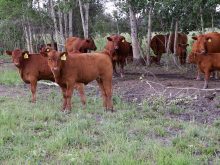MEDSTEAD, Sask. – Ryan Sommerfeld knows he has a lot to learn about cattle politics and policy.
But the 29-year-old, who with his wife, Michelle, and his parents, Ray and Pauline, raises 220 cow-calf pairs north of Medstead, Sask., said he is up to the challenge.
Sommerfeld was appointed by the board of the Saskatchewan Cattlemen’s Association to fill the vacancy in District 9A after no one stepped forward to run in last fall’s election.
“I think it’s a pretty good opportunity to kind of make a difference,” he said. “I’m younger and maybe bring a different perspective.”
Read Also

Trade war may create Canadian economic opportunities
Canada’s current tariff woes could open chances for long-term economic growth and a stronger Canadian economy, consultant says — It’s happened before.
He experienced the difficulty that all cattle producers have faced since BSE. The difference between him and many others is that he was just getting started and the conditions made it hard to expand.
“It’s been a very big struggle,” he said.
Sommerfeld returned to join the family Gelbvieh operation in 2001. He said raising cattle is in his blood and the plan is to take over from his parents at some point.
The family turned to Gelbviehs about 10 years ago, preferring the maternal traits and moderate size. Calving began Jan. 26.
About 80 percent of the cows are purebreds and the Sommerfelds sell between 20 and 25 bulls each year. They retain about 40 heifers.
Sommerfeld said producers need to work toward a better forage insurance program, cattle price insurance and something to help young farmers survive the first few years in the industry.
He works at the Spiritwood Stockyards and helps a neighbour with harvest to help make ends meet. Last year, he also worked with the Canadian Cattle Identification Agency scanning project.
He said it is an exciting time to be in the cattle business.
“It seems like there is a lot of optimism right now,” he said.
Prices have been good and trade deals are opening some doors.
The addition of the SCA to the provincial scene is also positive.
“A lot of producers will be unhappy and won’t say anything,” he said. “This empowers small producers to have a little stronger voice.”
Sommerfeld isn’t afraid to speak his mind and hopes to raise the profile of the SCA in his district and around the province.















